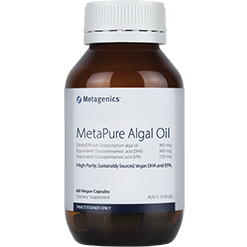Metagenics
Metagenics MetaPure Algal Oil 60 Caps
Metagenics MetaPure Algal Oil 60 Caps
Couldn't load pickup availability
PLEASE NOTE: THIS IS A PRACTITIONER ONLY SUPPLEMENT. IF YOU ARE PURCHASING THIS FOR THE FIRST TIME AND HAVE NOT BEEN ADVISED BY A HEALTH PRACTITIONER TO USE THIS PRODUCT, WE WILL NEED TO CONTACT YOU TO DISCUSS APPROPRIATE & SAFE USE BEFORE DISPATCH. PLEASE SUPPLY YOUR CONTACT DETAILS.
Metagenics MetaPure Algal Oil is high purirty, sustainably sourced vegan omega 3 oil with DHA & EPA. Ensuring optimal DHA and EPA levels will support a healthy pregnancy and will aid cognitive and mental function
Clinical Benefits:
- Metagenics MetaPure Algal Oil provides a vegan source of omega-3 essential fatty acids (EFAs) derived from algae, encapsulated in tapioca-based softgels. Algae-rich EFAs exert the same therapeutic benefits as EPA and DHA derived from traditional fish oil. Metagenics MetaPure Algal Oil is sourced from algae grown under closed and controlled conditions ensuring the algae are not exposed to environmental contaminants present in oceans. Metagenics MetaPure Algal Oil is rigorously screened for contaminants such as heavy metals (cadmium, lead, mercury and arsenic) and oxidation (anisidine and peroxide) ensuring purity levels that significantly exceed TGA standards, delivering a fresh and pure product.
- Metagenics MetaPure Algal Oil contains vegan-friendly DHA, which is required for brain, nervous system and cognitive health. DHA is integral to neural membrane phospholipid composition in the brain, retina and neural tissues, making DHA an essential prescription for people affected by memory or vision related conditions. Both EPA and DHA has been shown to improve cognitive function while EFAs have been shown to regulate mood.
- DHA is essential for prenatal human brain development with a deficiency having marked consequences for vision, cognition, cerebellar function, and neurological health. DHA is critical for brain growth, which is especially rapid from the third trimester of pregnancy until 18 months after birth. DHA is conferred to infants via the placenta and breastfeeding, however human milk levels of DHA have shown variations relating to maternal dietary DHA intake.
- Metagenics MetaPure Algal oil provides a vegan source of EPA and DHA, ideal for those undertaking sustainable or vegan lifestyles looking to maintain general health.
Ingredients:
DHA/EPA rich Schizochytrium algal oil 962.7mg
Equivalent Docosahexaenoic acid (DHA) 300mg
Equivalent Eicosapentaenoic acid (EPA) 150mg
Dose: Adults tale 1 capsule twice daily with food
Warnings:
Store below 25°C
Moderate Level Cautions:
- Anticoagulant/antiplatelet drugs: Clinical trials have shown high-dose fish oil omega-3 fatty acid consumption to be safe, even when concurrently administered with other agents that may increase bleeding (i.e. antiplatelet or antithrombotic medications such as aspirin and warfarin). The clinical trial evidence suggests that if such an increased bleeding risk exists, the risk is very small and not of clinical significance. For example, 6.8 g of EPA/DHA daily for 6 months showed no adverse effects. However, it is reasonable to monitor patients treated with fish oils and anticoagulants for international normalised ratio (INR) as well as potential adverse bleeding experiences.
- Bleeding disorders: Due to the anticoagulant properties of fish oils, there have been safety concerns in regards to the risk of increased bleeding tendency and postoperative bleeding. Although this theoretical possibility is not reflected functionally in human studies, it would still warrant caution in situations which carry a high risk of bleeding such as haemorrhagic stroke and postoperative events. To minimise the risk of exacerbation of these bleeding events it is recommended to discontinue use of fish oils during acute bleeding episodes, such as during and immediately after a haemorrhagic stroke, or in patients who are at high risk for haemorrhagic stroke.
- Surgery: Due to the anticoagulant properties of fish oils, there have been safety concerns in regards to the risk of increased bleeding tendency and postoperative bleeding. Although this theoretical possibility is not reflected functionally in human studies, it would still warrant caution in situations which carry a high risk of bleeding such as haemorrhagic stroke and postoperative events. To minimise the risk of exacerbation of these bleeding events it is recommended to discontinue use of fish oils 4-7 days before elective procedures which have a high risk for bleeding complications. However, consider fish oil supplementation postoperatively if there are no bleeding complications, given that supplementation may reduce the risk of thrombotic and cardiovascular events which could occur following major surgery.
Share


